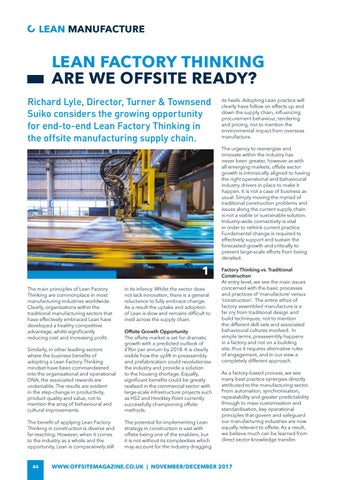LEAN MANUFACTURE
LEAN FACTORY THINKING ARE WE OFFSITE READY? Richard Lyle, Director, Turner & Townsend Suiko considers the growing opportunity for end-to-end Lean Factory Thinking in the offsite manufacturing supply chain.
1 The main principles of Lean Factory Thinking are commonplace in most manufacturing industries worldwide. Clearly, organisations within the traditional manufacturing sectors that have effectively embraced Lean have developed a healthy competitive advantage, whilst significantly reducing cost and increasing profit.
in its infancy. Whilst the sector does not lack innovation, there is a general reluctance to fully embrace change. As a result the uptake and adoption of Lean is slow and remains difficult to instil across the supply chain.
Similarly, in other leading sectors where the business benefits of adopting a Lean Factory Thinking mindset have been commandeered into the organisational and operational DNA, the associated rewards are undeniable. The results are evident in the step-change in productivity, product quality and value, not to mention the array of behavioural and cultural improvements.
Offsite Growth Opportunity The offsite market is set for dramatic growth with a predicted outlook of £9bn per annum by 2018. It is clearly visible how the uplift in preassembly and prefabrication could revolutionise the industry and provide a solution to the housing shortage. Equally, significant benefits could be greatly realised in the commercial sector with large-scale infrastructure projects such as HS2 and Hinckley Point currently successfully championing offsite methods.
The benefit of applying Lean Factory Thinking in construction is diverse and far-reaching. However, when it comes to the industry as a whole and the opportunity, Lean is comparatively still
The potential for implementing Lean strategy in construction is vast with offsite being one of the enablers, but it is not without its complexities which may account for the industry dragging
44
its heels. Adopting Lean practice will clearly have follow on effects up and down the supply chain, influencing procurement behaviour, tendering and pricing, not to mention the environmental impact from overseas manufacture. The urgency to reenergise and innovate within the industry has never been greater, however as with all emerging markets, offsite sector growth is intrinsically aligned to having the right operational and behavioural industry drivers in place to make it happen. It is not a case of business as usual. Simply moving the myriad of traditional construction problems and issues along the current supply chain is not a viable or sustainable solution. Industry-wide connectivity is vital in order to rethink current practice. Fundamental change is required to effectively support and sustain the forecasted growth and critically to prevent large-scale efforts from being derailed. Factory Thinking vs. Traditional Construction At entry level, we see the main issues concerned with the basic processes and practices of ‘manufacture’ versus ‘construction’. The entire ethos of factory assembled manufacture is a far cry from traditional design and build techniques; not to mention the different skill sets and associated behavioural cultures involved. In simple terms, preassembly happens in a factory and not on a building site, thus it requires alternative rules of engagement, and in our view a completely different approach. As a factory-based process, we see many best practice synergies directly attributed to the manufacturing sector. From automation, synchronisation, repeatability and greater predictability through to mass customisation and standardisation, key operational principles that govern and safeguard our manufacturing industries are now equally relevant to offsite. As a result, we believe much can be learned from direct sector knowledge transfer.
WWW.OFFSITEMAGAZINE.CO.UK | NOVEMBER/DECEMBER 2017
